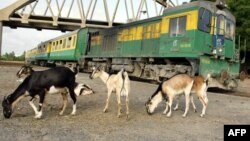Pest experts from across Africa have recommended vast vaccination and pest eradication programs to stop trans-border animal diseases that claim between 10 percent and 20 percent of the continent's animals yearly. The experts are gathered in the Cameroonian capital, Yaounde, under the United Nations Food and Agriculture Organization's program.
Cameroon Livestock Minister Dr. Taiga said pests such as nose bot flies, stomach worms, wool maggots, lice and ticks are causing havoc for animals in some communities in his country.
He said all animals in an environment can be killed if one animal is affected because the diseases are highly contagious and that is why the Food and Agriculture Organization and the World Organization for Animal Health are teaming up and gathering all countries to eradicate the diseases.
Quality protein
Taiga said when central African countries succeed in eradicating the pests, they will be able to provide better quality protein to their populations.
Dr. Sebastien Mongomo, animal pest expert from Equatorial Guinea, said diseases caused by the pests have claimed at least 10 percent of sheep and goats in his country this year.
He said the borders between Cameroon, Gabon and Equatorial Guinea are very porous and it is difficult to control the movement of animals.
Symptoms displayed by animals from the pests vary from minor itching and irritation to extreme annoyance and fatigue, malnutrition, and then death. Pests also can rapidly transmit diseases and cause secondary infections.
Developing strategies
Dr. Felix Njemi, Animal Health Officer of the Food and Agriculture Organization, said the losses are aggravating the food crisis especially in sub-Saharan African countries.
"The strategy is the large vaccination at the country level," said Njemi. "Undertake surveillance to detect any case of the disease and strengthen collaboration between member nations and even between international institutions. Imagine somebody who has 10 animals and loses eight. The disease can have impact in food security."
Susane Munstermann of the World Organization for Animal Health said they have agreed to help African countries with funding for disease and pest control, and also for surveillance programs.
"The nature of our assistance is first and foremost to develop international strategies that can be used by Africa, as well as a country, in let's say Asia or a country in Eastern Europe, affected by the disease," said Munstermann. "It is an international strategy which we are now going to translate into a national strategy, so the national strategy control plan is a result of the international strategy."
Poor people in most African countries rely on goats and sheep for their livelihoods. The Food and Agriculture Organization reports they become extremely vulnerable when they are hit by famine, and then pests attack and kill their animals.




